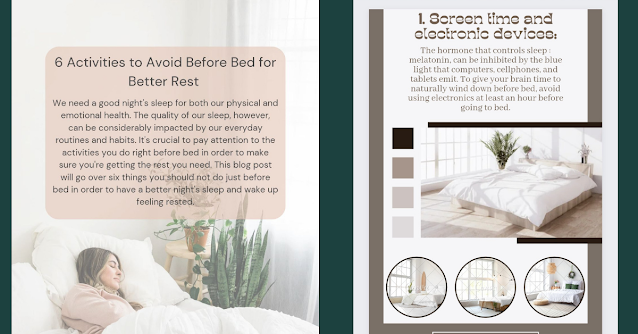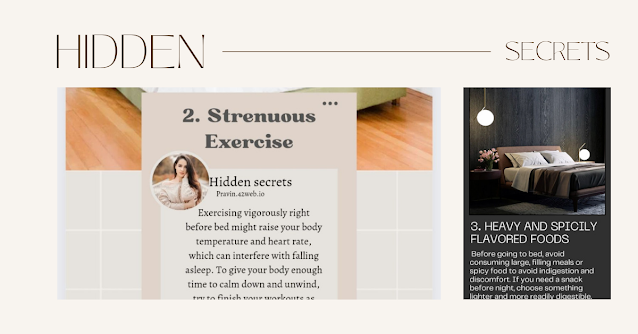Sleep Smarter: 6 Activities to Avoid Before Bed for Better Rest and Effective Ways to Address Sleep Apnea
Sleep Smarter: 6 Activities to Avoid Before Bed for Better Rest and Effective Ways to Address Sleep Apnea
Introduction:
Millions of individuals worldwide suffer from the sleep disorder known as sleep apnea, which is widespread yet frequently misdiagnosed. It is characterized by breathing pauses as you sleep, which can cause cognitive decline, daily weariness, and potentially more severe health problems. Investigate efficient treatments for sleep apnea if you or someone you love is affected by it if you want to get back to getting peaceful sleep. We'll examine the numerous methods you can use to control and reduce the signs and symptoms of sleep apnea in this blog post.
Read Also:- child during flu season tips
Understanding Sleep Apnea
When the muscles in the back of your throat relax too much during sleep, the airway becomes temporarily blocked. This breathing pause can last anywhere from a few seconds to several minutes, and it may occur several times throughout the course of the night. Obstructive sleep apnea (OSA) and central sleep apnea (CSA) are the two main kinds of sleep apnea. CSA is related to the brain's failure to properly indicate breathing, whereas OSA is more prevalent and results from a physical obstruction of the airway.
1. Methods to Tackle Sleep Apnea
1. Lifestyle adjustments:
- Weight control:
Carrying extra weight, particularly around the neck, might block the airways. Sleep apnea symptoms can be improved with a balanced diet and frequent exercise.
- Positional Therapy :
Sleeping on your side as opposed to your back can help avoid the collapse of the airway. This is known as positional therapy. The maintenance of a lateral sleeping posture might be helped by specialty pillows or equipment.
- Steer clear of alcohol:
and sedatives because they relax the muscles in your throat, causing sleep apnea to worsen. It can be very beneficial to reduce their intake, especially before night.
2. Continuous Positive Airway Pressure
(CPAP) Therapy:
- This approach of treating sleep apnea is very popular. It entails putting on a mask over your mouth and/or nose while a machine continuously blows air into your airway to keep it open.
- You can choose the CPAP machine that best meets your comfort preferences because they are available in a variety of types and sizes.
- Although getting used to CPAP therapy could take some time, the advantages of better sleep and fewer symptoms make the effort worthwhile.
3. Dental devices
or oral appliances are made to adjust the jaw and tongue in order to maintain the airway open while you sleep.
- These devices, which can be custom-made by a dentist who specializes in sleep disorders, are particularly helpful for mild to moderate cases of sleep apnea.
4. Surgery:
- When alternative treatment options fail or in extreme cases of sleep apnea, surgical treatments are taken into consideration.
- By removing extra tissue or realigning structures, procedures like uvulopalatopharyngoplasty (UPPP), genioglossus advancement (GA), and maxillomandibular advancement (MMA) seek to enlarge the airway.
Read Also:-Managing Diabetes Through Diet: A Guide to the Best Foods and Avoidances is the article
6 Activities to Avoid Before Bed for Better Rest :-
We need a good night's sleep for both our physical and emotional health. The quality of our sleep, however, can be considerably impacted by our everyday routines and habits. It's crucial to pay attention to the activities you do right before bed in order to make sure you're getting the rest you need. This blog post will go over six things you should not do just before bed in order to have a better night's sleep and wake up feeling rested.
1. Screen time and electronic devices:
The hormone that controls sleep : melatonin, can be inhibited by the blue light that computers, cellphones, and tablets emit. To give your brain time to naturally wind down before bed, avoid using electronics at least an hour before going to bed.
2. Strenuous Exercise:
Exercising vigorously right before bed might raise your body temperature and heart rate, which can interfere with falling asleep. To give your body enough time to calm down and unwind, try to finish your workouts as least two to three hours before going to bed.
3. Heavy and spicily flavored foods
Before going to bed, avoid consuming large, filling meals or spicy food to avoid indigestion and discomfort. If you need a snack before night, choose something lighter and more readily digestible. Try to eat your previous meal at least two to three hours before going to bed.
4. Alcohol and Caffeine:
Both alcohol and coffee might interfere with your sleep cycle. Avoid caffeine in the late afternoon and evening because it is a stimulant that can keep you awake. While alcohol may initially make you feel sleepy, it can have a detrimental effect on your REM sleep and interrupt your sleep cycle.
5. Work and Stressful Activities:
Working or doing stressful things right before night might keep your thoughts engaged and keep you from unwinding. Make time early in the evening to finish work or deal with unpleasant issues, and then give yourself permission to relax before going to bed.
6. intensive Mental Stimulation:
Taking part in activities that demand a lot of mental focus and stimulation, including intensive debates or problem-solving, can stimulate your brain and make it difficult to relax. Choose calming hobbies instead, such as reading a book, doing gentle yoga, or listening to tranquil music.
Conclusion:
Creating a bedtime routine that emphasizes slowing down and relaxation will greatly enhance the quality of your sleep. You're giving your body and mind the chance to enter a restful sleep state by eliminating screen time, large meals, stimulants, and intellectually demanding activities just before bed. Keep in mind that making minor adjustments to your pre-sleep routine can result in greater overall health and more restful evenings. So, try to put these sleep-smart strategies into practice so that you can wake up each morning feeling refreshed.
To avoid having sleep apnea negatively affect your general health and well-being, it is important to pay attention to and manage this issue. There are various ways to properly treat sleep apnea, including dietary modifications, specialist therapy, and surgical procedures. Determine the best course of treatment for your unique situation by speaking with a medical expert, like a sleep specialist or an otolaryngologist. You can anticipate getting better sleep and a higher quality of life by proactively addressing sleep apnea.
FAQS:-
Q1. What are the typical signs of sleep apnea?
Answer: Loud snoring, instances of gasping or choking while sleeping, excessive daytime sleepiness, difficulties concentrating, headaches in the morning, and irritability are all typical signs of sleep apnea.
Q2. Can sleep apnea be identified at home?
Answer : Although there are some at-home sleep apnea tests available, a polysomnogram, or sleep study, carried out at a sleep clinic, is the best way to make a conclusive diagnosis. This study tracks a variety of factors during sleep, such as brain activity, eye movement, heart rate, and breathing patterns.
Q3. Who is susceptible to acquiring sleep apnea?
Answer : People of all ages and genders can develop sleep apnea, but several circumstances make it more likely. These include being male, being older, having a big neck circumference, being overweight, and having a history of sleep apnea in the family. Smoking and drinking alcohol can both increase the risk due to lifestyle variables.
Q4. What effects does untreated sleep apnea have on general health?
Answer : Cardiovascular issues like high blood pressure, heart disease, and stroke are more likely when sleep apnea is left untreated. Additionally, it can cause diabetes, excessive daytime weariness that makes it difficult to work on a regular basis, and a higher risk of accidents since it affects focus.
Q5. Can children get sleep apnea?
Answer : Yes, children can acquire sleep apnea. Tonsils or adenoids that are swollen are frequent causes. Poor academic performance, frequent bedwetting, and trouble waking up are all signs of sleep apnea in kids.
Q6. Are there natural remedies that can help with sleep apnea?
Answer : While natural remedies can offer some comfort, they might not completely cure sleep apnea. Modifying your lifestyle to sleep on your side, maintain a healthy weight, and practice excellent sleep hygiene will help you control your symptoms to some extent.
Q7. Is it the only choice for people with severe cases of sleep apnea?
Answer : Surgery is often considered when other treatment options have failed or in cases of severe sleep apnea. Before turning to surgery, CPAP treatment and oral appliances are frequently tried. In order to lessen obstruction, surgical treatments try to physically alter the airway.
Q8. Can sleep apnea be treated?
Answer : Sleep apnea can often be well controlled, even if it may not always be completely curable. Changes in lifestyle, CPAP therapy, oral appliances, and occasionally surgery can greatly lessen symptoms and enhance sleep.
Q9. Do CPAP treatments have any negative effects?
Answer : Although CPAP therapy is typically tolerated well, some users may have adverse effects such nasal congestion, dry mouth, skin irritation, or trouble getting used to the mask. Addressing these problems might be aided by close collaboration with a healthcare provider.
Q10. Can someone with sleep apnea operate a vehicle?
Answer : You can usually drive if your sleep apnea is well-managed and your symptoms are under control. However, it is advised against driving until your sleep apnea is effectively managed if it interferes with your daytime alertness and concentration.
Read Also:-Knowing the Causes, Signs, type, and Treatments of Kidney Stones
Remember, it's crucial to see a doctor for an accurate diagnosis and treatment suggestions if you believe you or someone you know has sleep apnea.







Post a Comment